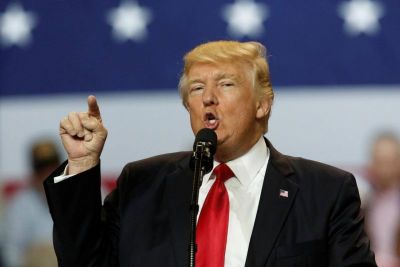Some Candid Questions for Evangelical Supporters of President Trump

Do you remember when candidate Trump said that he could stand on Fifth Avenue in New York City and shoot someone and he wouldn't lose any voters? It was quite a statement, but there was some truth to it. Trump's loyal supporters are doggedly loyal. The question is: Are his evangelical supporters just as loyal? The deeper question is: Should they be?
For the record, while I strongly opposed candidate Trump during the Republican primaries, I did vote for him over Hillary Clinton. And I'm glad I did. If the elections were held tomorrow and it was Trump vs. Hillary, he would have my vote without question.
But he does not have my undivided loyalty. Why should he? As I wrote previously, President Trump didn't die for my sins and he is not my Savior and Redeemer.
Of course, every evangelical Christian could echo those words. (We do not worship Lord Trump.) Yet sometimes I wonder: What would it take for some of us to differ publicly with the president? What would it take for us to say, "He's my president and I deeply appreciate the many good things he has done. But I wish he didn't say (or do) this."
So, to repeat my question: What would it take for some of us to differ publicly with the president?
Cal Thomas recently offered some unsolicited counsel to President Trump, suggesting that rather than attacking LeBron James via Twitter, he should have invited him to the White House.
It's true that James has been openly critical of the president. And it's true he made negative comments about him on CNN, speaking with Don Lemon, no less.
But what he said this time was hardly outlandish. (His exact words were: "He's dividing us. And what I've noticed over the past few months [is] he's kind of used sport to kind of divide us, and that's something that I can't relate to, because I know that sport was the first time I ever was around someone white, and I got an opportunity to see them and learn about them, and they got an opportunity to learn about me, and we became very good friends.".)
And part of the CNN interview focused on James's education initiative is to help at-risk kids.
What a great opportunity for Trump to say, "Let's unite to help these kids. Let's put aside our differences for the sake of young Americans."
Instead, our president ignited a fresh firestorm, mocking both James and Lemon. (His exact words were: "Lebron James was just interviewed by the dumbest man on television, Don Lemon. He made Lebron look smart, which isn't easy to do. I like Mike!")
I really wish he hadn't done that. Yet I'm sure some of you reading this (I'm referring specifically to evangelical Christian readers) were glad he did: "I'm glad he put that basketball player in his place! Who does James think he is, speaking against the President of the United States?"
To my surprise, I've heard evangelical leaders defend Trump's harsh tweets, saying things like, "Well, he's the president, not a Christian leader." Or, "It's about time someone put politics aside and spoke his mind."
But when I hear this, I wince. Yes, it's true that Trump is not a Christian leader, but we are still Christians. And some of us are Christian leaders. (As for Trump if he is a Christian at all, God knows; but he is clearly not a Christian leader.)
Does the nasty rhetoric not bother us at all? Do the insults never offend us? Do we never think to ourselves, "He could even more done if he didn't constantly alienate people?"
And this leads to another question: Have we ourselves become caustic? In our reaction against the savage, unrelenting, often unfair attacks from the left, have we decided to defend the president no matter what, even if it means compromising our values? Has the "this is war" mentality hardened us rather than honed us?
A colleague of mine forwarded to me an article by Pete Enns titled, "Is it OK for Christians to protest against their political leaders?"
His answer: "It is the Christian's duty in civic affairs to hold powers to account when they see injustice done."
He adds, "In my opinion, nowhere do Christians have a more visible and obvious responsibility to be salt and light, to embody the will of God, than when other humans are disenfranchised, treated unjustly, or unfairly—which is to say, treated less than fully human."
He even writes that, "Christians should never say to someone like that, 'If you don't like it, move to Denmark,' or 'He's your president and you owe him your allegiance.'"
Perhaps his article will step on some toes. Perhaps some will feel he made a good point but took it to far.
At the least, though, as evangelical followers of Jesus who support Trump, we should ask ourselves some honest questions. First and foremost would be this: Has my allegiance to Donald Trump in any way compromised my allegiance to Jesus?
That's the biggest question of all.




















